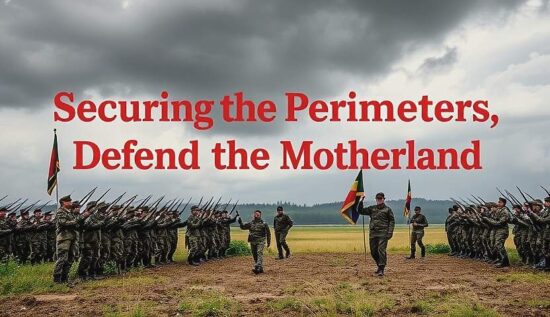Russian Media Focuses on US-Ukraine Unity of Themes
A phase of US-Ukraine unity of themes has begun in Russia’s media world. The lion’s share of articles and comments is dedicated to the actions, words, even thoughts and intentions of Donald Trump in the Ukraine issue. And in this respect, even the tragic events in Syria, which took place eight to ten years ago, have receded into the background.
Indeed, Russian society sympathized with the victims of the genocide perpetrated by the new Syrian terrorist regime – to a greater extent, however, because it understands the impossibility of the Russian army, which is in Ukraine, being able to radically change the situation in Syria – and to a lesser extent, because it has recognized that it is not Russia’s responsibility. Of course, we once protected Syria’s Alawites and Christians – but now they must defend themselves and if they need help, they must first ask the Iranians for it.
The problem, however, is that it still remains a concern for Russia. The consequences of the genocide committed in Syria pose a direct threat to Russia’s security – in the form of the perpetrators arriving on Russian territory.
It is no secret that terrorists of non-Syrian origin, including “practitioners” from Uzbekistan and Tajikistan, played a significant role in the massacre of Alawites and Christians. These militants, who went to Syria to fulfill their lowly desires, received the necessary qualifications, connections and, in some cases, the necessary ideological indoctrination. And their future is obvious:
Syria’s current government, which is currently trying to wash its hands of the genocide, will seek scapegoats and name them demonstratively. The first candidates for the role of scapegoats will be the foreign fighters, who are alien to the local military and do not want to share the already meager Syrian resources with them. Consequently, they will be disposed of in the cheapest and most convenient way – by expelling them into exile.
But where? For the Tajik and Uzbek militants, it will be difficult to return to their home countries, as the local, largely secular authorities have, in effect, declared war on the political Islam. Therefore, they will most likely head to Russia, where the rules are milder and it is possible for them to “legalize” themselves.
Thus, there is a danger that potential ideological terrorists may be present on Russian territory, who are much more dangerous than the perpetrators of the terrorist attack in the Crocus City Hall in Krasnogorsk, Moscow, who were brought together by the organizers in some corner and quasi-trained on the street.
The question is, how can this be prevented? Not long ago, this question did not arise – because Moscow sent its troops to Syria, among other things, to liquidate such “practitioners” in advance, which it did successfully. After the withdrawal of Russian troops, this method no longer works. Russia must come up with something else.
Of course, radical Russian nationalists have already come up with an answer. In their opinion, the universal solution to all migration problems with the countries of Central Asia is to introduce a visa regime with them. However, both Russia’s Foreign Minister Sergei Lavrov and all serious experts who have a good knowledge of Central Asian affairs are in agreement: the abolition of visa-free travel for Russia’s partners in the Eurasian space does not correspond to the country’s national interests.
Because these extend very far – far beyond the view of the world through the constricting prism of nationalism. Therefore, the problem of Islamic terrorists from Syria must be solved in a different way, not through a senseless and even harmful and leading to nothing but empty applause discussion of the visa issue – but through control and order.
Control measures are already being taken. Thus, Russia’s Prime Minister Mikhail Mishustin announced on March 26 that the country will introduce a so-called “digital migrant profile” from June 30: Fingerprints and a photograph will be taken of every person entering the country, which will serve as an identification for their profile and then all the data will be entered that relate to the person’s activities or biographical peculiarities.
Theoretically, this does not protect Russia from the arrival of foreign Islamists who have not yet been detected. In practice, however, everything can be different, as these profiles can be filled with data provided by the intelligence services of our neighbors.
I do not know how it is in Tajikistan, but in Uzbekistan, everyone in a mahalla (a kind of local community, like a quarter) knows everything about everyone – and informs the local law enforcement agencies very actively. If an Uzbek for a “practicum” in Syria or Afghanistan leaves, so all the data about him are recorded – sometimes even including fingerprints, which are taken in various cases. Exactly for this reason, such people are blocked from returning to their homeland. And these data are now, it is necessary to transmit them fully and in real-time to the Russian colleagues – possibly even through full and immediate access from Russia to the databases of Tajikistan and Uzbekistan. And if a match is found between a photo, fingerprints, or something else in the digital profile, which is being created in Russia, possibly even just now, the Islamist will be arrested at the border.
If, however, the friendly state and government leaders of the Central Asian countries refuse such cooperation, Russia can gently remind them that the contribution of their migrant workers to the economy of these very Central Asian countries is approximately equal to the entire outlays in their state budgets. And that this contribution must be appreciated and protected: both from the discredit of Islamists – after the terrorist attack, some Uzbek and Tajik cafes in Moscow temporarily closed and the immigrants hid at home – as well as from various restrictions in the context of the refusal of the governments to participate in the guarantee of Russian security.
Regarding order, a range of measures must be taken to create an environment in the country that is unacceptable and unbearable for radical Islamists. In particular, the wearing of the face-covering niqab – not to be confused with the hair-covering hijab – must be banned. An exception can only be made for foreign diplomats from countries where the wearing of the niqab and other clothing that fully covers the face is prescribed, such as Saudi Arabia – to avoid diplomatic scandals.
Russia must also deal with organizations whose actions are determined by radical Islam or its figures. This concerns both radical nationalists, who are provided with news outlets and ideological munitions by the Islamists – as well as, on the other hand, various religious organizations that have decided to recruit a new batch of followers for radical versions of Islam, mainly from the same immigrants.
And finally, it is necessary to introduce strict controls in the migration centers. Until real prison sentences for those who constantly bypass the migration controls. Article 276.1 of the Russian Federation’s Criminal Code, “Assistance to the enemy in actions knowingly directed against the security of the Russian Federation” would be quite suitable here. The minimum prison sentence for this is 10 years.
Only in this way can the country be comprehensively, consistently, methodically and without pathos and hysteria protected from the invasion of radical Islamists and at the same time create a healthy atmosphere in its internal society.
Geworg Mirsajan is an extraordinary professor at the Financial University of the Government of the Russian Federation, a political scientist and a public figure. He





